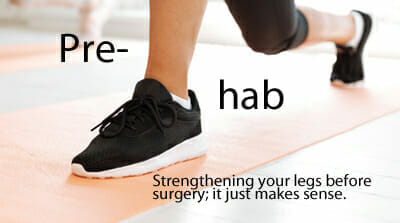Osteoarthritis (OA)
Osteoarthritis (OA) is a degenerative joint condition that leads to pain and stiffness through progressive wear and tear. Normally, knee replacements are performed as a result of severe OA. This means that many individuals have had to deal with pain and stiffness symptoms for many years before surgery is recommended. As a result, secondary problems like muscle weakness, inflexibility, restriction in joint range, muscular tension and reduced exercise tolerance develops. These factors may make the initial recovery time and post-operative rehabilitation slightly longer or more difficult. So, what can we do to help post knee replacement recovery?
The aim of rehabilitation after joint replacement is to help you regain strength and mobility to return to normal daily life activities. Regaining full knee range of motion after a knee replacement can be hard work but setting yourself up before the surgery can make your rehabilitation a lot easier.
Pre-surgery rehabilitation (prehab):
Pre-surgery rehabilitation, or prehab, looks to start you on exercises to improve strength, flexibility, motion, balance and overall physical health. One function of exercise pre-surgery is aimed at reducing overall pain and stiffness before the procedure. Specific exercise like walking, hydrotherapy and knee strengthening has been shown to reduce pain, improve knee strength and improve overall functional capacity in those with osteoarthritis (Rejeski et al 1997). As knee strength is a good indicator of a patient’s ability to perform overall daily function, building strength before surgery may help speed the return to normal daily life activity post-operatively.
Prehab aims to improve your knee function prior to the replacement. This has been shown to help assist some of the physical and mental barriers you might experience prior to surgery, therefore helping to reduce the overall intervention required afterwards (Topp et al 2002). Prehab before knee replacement has also been shown to reduce initial inpatient rehabilitation time (Rooks et al 2006). This means that you can get home from surgery sooner, reducing overall hospital expenses. Pre-operative exercise also helps to improve blood flow and therefore may reduce some of the risks during and after surgery like infection.
How we can help:
Our Chartered Physiotherapists can help you set up a prehab knee program. Generally, the program should last at least 6-8 weeks before surgery but starting exercise early is never a bad idea. Exercises should focus on quadriceps, hamstring and gluteal strength, knee range of motion and overall back and lower leg flexibility. Below are some of the exercises that we recommend.
Exercises
Mini squat:
With your feet hip width apart, slowly lower your body into a mini squat position (hips and knees at 45 degrees) while keeping your back straight and your knee caps over your second toes. 2×10
Heel raises: Holding onto a bench in front of you, slowly raise your heels to lift up onto the balls of your feet. Slowly lower. 2×10
Standing hip abduction: Holding onto a bench next to you, stand straight and lift one leg out to the side and back again. 2×10
Leg slides: Lying on your back with your legs straight, slowly slide your heel up the bed to bend your knee as much as possible. Slide back down. 2×10
Knee extension:
With a rolled-up towel under your knee, lift your heel off the bed to straighten your knee. Slowly lower back down. 2×10
Hamstring stretch: Lying on your back, place a belt or strap around the arch of your foot. Holding the ends of the strap with your hands, lift your leg up into the air with your knee as straight as possible until you feel a gentle stretch in the back of your leg. Allow your arms to help support the stretch through the strap. 30 second hold.
Stationary bike:
10-15minutes of low resistance cycling can aid to lubricate your knee joint and help improve mobility along with improving heart health and knee strength.
These simple exercises amongst others can be modified and progressed by your Chartered Physiotherapist in the prehab phase to improve knee range and strength pre-operatively and reduce post knee replacement recovery time, rehabilitation expenses and inpatient hospital stay.
If you would like more information, please contact us on 021 4633455 or you can book an appointment online by clicking here
We hope you enjoyed today’s blog by Carol O’Brien, Chartered Physiotherapist.

